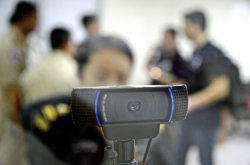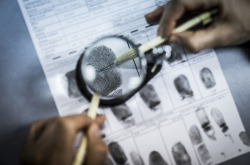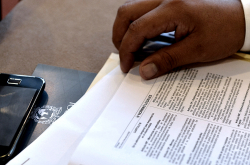La plateforme biométrique permet aux policiers d’identifier des terroristes ou des malfaiteurs présumés en comparant directement leurs photos et leurs empreintes digitales avec celles contenues dans les bases de données d’INTERPOL.
VIENNE (Autriche) – Mi-novembre, un passeur de migrants en fuite a fait l’objet d’un contrôle de police à Sarajevo (Bosnie-Herzégovine) alors qu’il se trouvait dans un groupe de migrants voyageant à travers les Balkans pour se rendre en Europe occidentale.
Recherché pour criminalité organisée et traite d’êtres humains depuis 2021, ce passeur prétendait être un migrant parmi les autres et circulait sous un faux nom avec un document d’identité frauduleux pour ne pas être repéré.
Le contrôle de police faisait partie d’une opération d’INTERPOL au cours de laquelle la plateforme biométrique a été utilisée à distance pour la première fois. Ce nouvel outil permet de comparer des données biométriques avec celles contenues dans les bases de données mondiales de l’Organisation dédiées aux empreintes digitales et à la reconnaissance faciale.
Lorsque la photo du passeur a été introduite dans la plateforme biométrique, celle-ci a immédiatement montré que l’individu était recherché dans un autre pays européen. Il a été arrêté et est actuellement en attente d’extradition.
L’opération, qui a eu lieu dans six pays de la région de l’Adriatique, s’inscrivait dans le cadre de l’initiative Hotspot d’INTERPOL, fondée sur l’utilisation des données biométriques aux fins du repérage des combattants terroristes étrangers lorsqu’ils franchissent des points de passage frontaliers illégaux.
Comme l’a déclaré Cyril Gout, Directeur de l’Appui opérationnel et de l’Analyse à INTERPOL :
« Un malfaiteur en fuite peut changer de nom et modifier radicalement son apparence pour essayer d’échapper à la justice, mais il est difficile, voire impossible de modifier des données biométriques. C’est pourquoi la biométrie reste le moyen le plus fiable d’identifier une personne.
Un million de recherches par jour
La plateforme biométrique s’appuie sur un « noyau biométrique » qui englobe les bases de données d’INTERPOL déjà dédiées aux empreintes digitales et à la reconnaissance faciale et un système de comparaison fondé sur une technologie développée par la société IDEMIA.
Cet outil efficace destiné au contrôle des personnes aux frontières peut également être utilisé pour des opérations de police courantes sur un territoire national.
Au cours des deux prochaines années, il sera progressivement mis à la disposition des postes-frontières et des agents de première ligne dans les pays membres d’INTERPOL.
Selon les prévisions, le système pourra traiter chaque jour un million de recherches à partir de données criminalistiques telles que des empreintes digitales, des empreintes palmaires et des images faciales.
Amélioration de la gouvernance des données
Jusqu’à présent, les recherches dans les bases de données biométriques d’INTERPOL faisaient l’objet de différents processus en plusieurs étapes qui nécessitaient systématiquement des interventions ou des vérifications humaines. Les signalements positifs n’étaient donc pas immédiatement portés à la connaissance de l’agent qui consultait la base de données.
Avec la plateforme biométrique, les agents peuvent transmettre des données dans les deux bases via une interface unique qui renvoie rapidement les résultats et offre aux utilisateurs la possibilité de suivre l’état d’avancement de leurs demandes.
Une intervention humaine n’a lieu que lorsque des experts en criminalistique d’INTERPOL doivent examiner les données biométriques saisies car leur qualité est insuffisante pour que le seuil de concordance défini soit atteint.
Il est important de noter que la plateforme biométrique améliore encore la gouvernance des données, s’inscrivant ainsi pleinement dans le solide cadre de protection des données d’INTERPOL.
Les données biométriques qui transitent par la plateforme lors d’une recherche ne sont pas enregistrées dans les bases de données criminelles d’INTERPOL et ne sont pas visibles par les autres utilisateurs, et celles qui ne déclenchent pas de signalement positif sont effacées une fois la recherche terminée.
Après avoir été présentée au début de l’année lors de la Conférence des Chefs de B.C.N. INTERPOL à Singapour, la plateforme biométrique a été déployée en octobre et elle est aujourd’hui à la disposition des 196 pays membres de l’Organisation.








